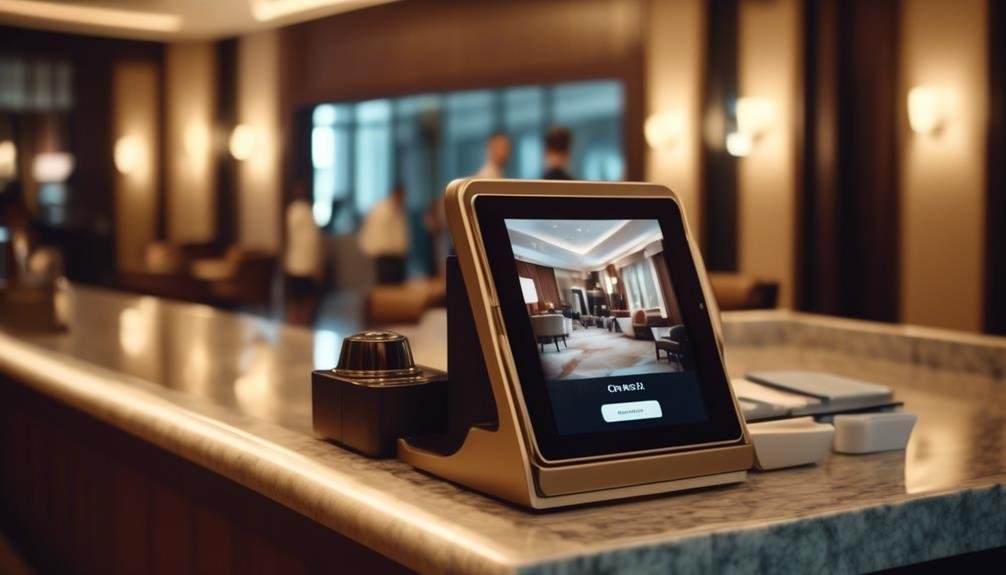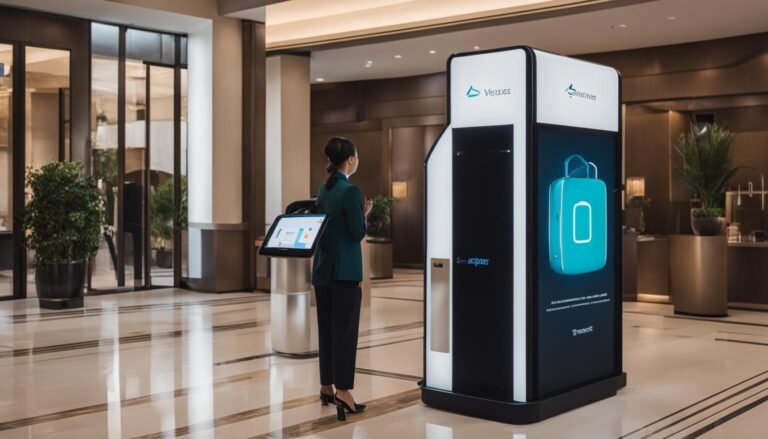Adapting to Technological Changes in the Hospitality Sector
You're probably aware of the rapid pace at which technology is transforming the hospitality industry. From online booking platforms to AI-powered solutions, the landscape is constantly evolving.
As a professional in the hospitality sector, you may find yourself navigating these changes and seeking ways to adapt. Whether it's enhancing guest experiences or overcoming challenges in implementation, the impact of technological advancements is undeniable.
In this discussion, we'll explore the key shifts in hospitality technology, the implications for your role, and the future trends that will shape the industry.
Key Takeaways
- Integration of technology has enhanced guest experiences and improved operational efficiency in the hospitality industry.
- Online booking platforms have simplified the reservation process, expanded reach, and provided valuable guest data.
- AI-powered solutions, such as chatbots and predictive analytics, optimize operations and personalize guest interactions.
- Technology, including digital concierge services and smart room technology, enhances overall guest experiences and offers convenience.
Evolution of Hospitality Technology
As technology continues to advance at a rapid pace, the hospitality industry has undergone a significant evolution in its use of technological solutions to enhance guest experiences and streamline operational processes. Tech integration has become a cornerstone of modern hospitality, with businesses leveraging various tools and systems to deliver high-quality services. From mobile check-in options to in-room automation, the industry has adapted to meet the growing demand for seamless, tech-driven experiences.
The integration of technology has also revolutionized back-end operations, facilitating efficient management of reservations, inventory, and customer relationship management. This industry adaptation hasn't only improved overall operational efficiency but also allowed for more personalized guest interactions and tailored services.
Moreover, technological integration has enabled the collection and analysis of vast amounts of guest data, providing valuable insights that inform strategic decision-making. This analytical approach has empowered hospitality businesses to anticipate guest needs, optimize pricing strategies, and tailor marketing efforts effectively.
As the industry continues to embrace innovative technological solutions, it's essential for hospitality businesses to stay ahead of the curve, continuously evaluating and implementing new technologies to meet and exceed guest expectations while driving operational excellence.
Impact of Online Booking Platforms
The evolution of hospitality technology has catalyzed a seismic shift in the industry's approach to guest interactions and operational efficiency. Online booking platforms have revolutionized the way guests interact with hospitality services, offering unparalleled convenience and accessibility. Here's why online booking platforms have become indispensable in the hospitality sector:
- Streamlined Booking Process: Online platforms simplify the reservation process, allowing guests to book accommodations and services with just a few clicks, enhancing customer experience and operational efficiency.
- Global Reach: These platforms enable properties to reach a broader audience, attracting international guests and diversifying clientele.
- Online Payment: The integration of online payment systems provides a secure and efficient transaction process, minimizing the hassle of handling physical payments.
- Enhanced Customer Reviews: Online booking platforms often include a review system, empowering guests to share their experiences and providing valuable feedback for continuous improvement.
- Data-Driven Insights: The data collected through online platforms offer invaluable insights into guest preferences and booking patterns, enabling properties to tailor their services to meet evolving customer needs.
Embracing AI-Powered Solutions
You can leverage AI for personalization to enhance the guest experience and build customer loyalty.
By implementing AI-powered solutions, you can streamline operations, optimize resource allocation, and improve overall efficiency.
Embracing AI technology presents an opportunity to stay ahead of the curve and meet the evolving demands of the hospitality industry.
AI for Personalization
Embracing AI-powered solutions for personalization in the hospitality sector has revolutionized the way businesses engage with their guests, offering tailored experiences that drive customer satisfaction and loyalty. AI personalization enables hotels to anticipate guest preferences and deliver customized services, enhancing the overall guest experience.
Here's how AI is transforming personalization in the hospitality sector:
- Predictive Analytics: AI analyzes guest data to predict preferences and behavior, allowing hotels to offer personalized recommendations.
- Chatbots and Virtual Assistants: AI-powered chatbots provide instant responses to guest queries, enhancing engagement and delivering personalized assistance.
- Dynamic Pricing: AI algorithms analyze demand patterns to optimize pricing, offering personalized rates based on individual guest behavior.
- Personalized Marketing: AI enables targeted marketing campaigns, delivering personalized offers and content to specific guest segments.
- Enhanced Guest Feedback: AI analyzes guest feedback to identify trends and personalize service improvements, ensuring a more tailored guest experience.
Operational Efficiency With AI
Efficiently integrating AI-powered solutions into hospitality operations has become a strategic imperative for staying competitive and meeting evolving guest expectations. AI driven automation is revolutionizing the industry, streamlining processes, and enhancing operational efficiency. By harnessing the power of AI, hotels can optimize staff allocation, personalize guest experiences, and forecast demand with greater accuracy. Take a look at the table below to see the potential impact of AI on various operational aspects in the hospitality sector:
| Operational Aspect | Potential Impact of AI |
|---|---|
| Staff Allocation | Optimized scheduling and task assignment |
| Guest Experience | Personalized recommendations and services |
| Demand Forecasting | Enhanced accuracy and real-time adjustments |
| Cost Management | Efficient resource allocation and waste reduction |
Enhancing Guest Experiences With Technology
Guest experiences in the hospitality sector are being revolutionized through the strategic integration of innovative technologies. The utilization of digital concierge services and smart room technology has significantly enhanced the overall guest experience, providing a seamless and personalized stay.
The following advancements are shaping the way guests interact and engage with hospitality services:
- Personalized Recommendations: Implementing AI-driven algorithms enables the provision of tailored suggestions for dining, activities, and local attractions, based on guests' preferences and previous choices.
- Contactless Check-in/Check-out: Streamlining the arrival and departure processes through mobile check-in and digital key technology ensures a smooth and efficient experience for guests, while also minimizing physical touchpoints.
- In-Room Automation: Smart room technology allows guests to control room features such as lighting, temperature, and entertainment systems through their smartphones or voice commands, enhancing convenience and comfort.
- Virtual Reality Tours: Offering virtual tours of the hotel facilities and nearby attractions provides an immersive preview for potential guests, helping them make more informed booking decisions.
- Enhanced Communication Channels: Utilizing messaging apps and chatbots enables guests to easily communicate their requests, provide feedback, and seek assistance, thereby fostering improved guest-staff interactions.
Overcoming Challenges in Implementation
To successfully implement technological changes in the hospitality sector, you need to focus on training your staff effectively to ensure they're equipped to utilize new systems and tools.
Managing resistance to change is crucial, and addressing concerns and providing support can help overcome this challenge.
Additionally, updating infrastructure to support new technologies is essential for a seamless implementation process.
Training Staff Effectively
Overcoming the challenges in effectively training staff in the hospitality sector requires a strategic approach that integrates interactive technology and personalized learning techniques.
Interactive learning tools, such as virtual simulations, can provide hands-on experience in a controlled environment, allowing staff to practice real-life scenarios.
Additionally, utilizing mobile learning applications enables employees to access training materials at their convenience, promoting continuous learning and skill development.
Implementing a mentorship program where experienced staff members can provide guidance and support to new hires fosters a collaborative learning environment.
Furthermore, incorporating gamification elements into training modules can enhance engagement and motivation, making the learning process more enjoyable and effective.
Lastly, regularly gathering feedback from staff about their training experiences can help identify areas for improvement and ensure that training programs remain relevant and impactful.
Managing Resistance
Resistance to change is a common hurdle in implementing new technologies in the hospitality sector, requiring innovative strategies for managing and overcoming it. To effectively manage resistance, it's crucial to address objections and concerns head-on.
Implementing change management techniques such as involving staff in the decision-making process, providing clear communication about the benefits of the new technologies, and offering training and support can help alleviate resistance.
Additionally, creating a culture that embraces continuous learning and improvement can foster a more receptive environment for change. Acknowledging and empathizing with the challenges that come with technological changes, while also highlighting the potential positive impact on daily tasks and overall guest experience, can help shift mindsets.
Updating Infrastructure
Navigating the challenges of implementing technological changes in the hospitality sector, particularly in updating infrastructure, requires a strategic approach to ensure smooth integration and minimal disruption. When updating infrastructure, consider the following:
- Assess Current Systems: Evaluate existing infrastructure to identify areas that require upgrading.
- Invest in Modern Equipment: Upgrade to state-of-the-art technology and modernize equipment to improve efficiency and guest experience.
- Infrastructure Scalability: Ensure that the updated infrastructure can handle future technological advancements and increased demands.
- Employee Training: Provide comprehensive training to staff on how to use and maintain the new equipment and facilities.
- Safety and Compliance: Ensure that the upgraded facilities meet safety standards and comply with industry regulations.
Future Trends in Hospitality Tech
As the hospitality industry continues to evolve, the integration of advanced technologies is poised to revolutionize the guest experience and operational efficiency. One of the most intriguing future trends in hospitality tech is the concept of smart rooms. These rooms are equipped with IoT devices that enable personalized experiences for guests.
From adjusting room temperature and lighting preferences to customized entertainment options, smart rooms offer a high level of convenience and comfort. Additionally, virtual concierge services are gaining momentum in the industry. By leveraging AI and chatbot technologies, virtual concierges provide guests with instant assistance and recommendations, enhancing their overall stay.
This not only streamlines guest services but also allows staff to focus on more complex guest needs and operational tasks.
The adoption of smart rooms and virtual concierges represents a shift towards a more connected and seamless guest experience. For hospitality businesses, investing in these technologies can lead to increased guest satisfaction, improved operational efficiency, and a competitive edge in the market.
Embracing these future trends in hospitality tech is essential for staying ahead in an industry that's becoming increasingly technology-driven.
Conclusion
As the hospitality sector continues to evolve with technological advancements, it's crucial for businesses to adapt and embrace the changes in order to stay competitive.
By leveraging AI-powered solutions and online booking platforms, hotels and restaurants can enhance guest experiences and streamline operations.
Overcoming challenges in implementation is essential for success, and staying ahead of future trends in hospitality tech will ensure continued growth and innovation in the industry.
Embracing technology is the key to unlocking the full potential of the hospitality sector.







